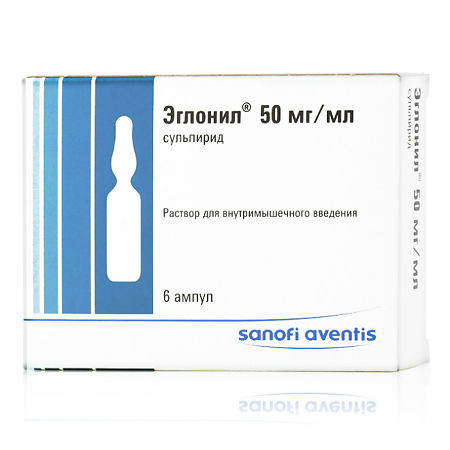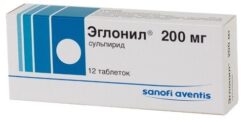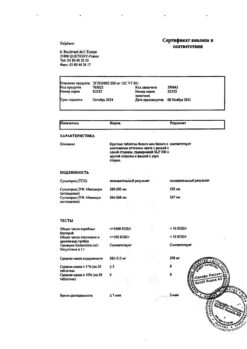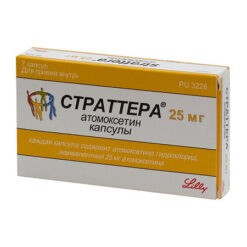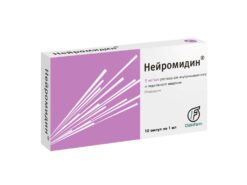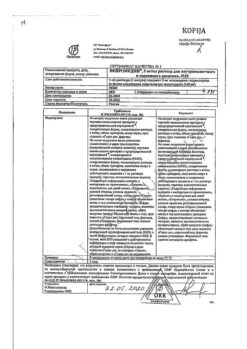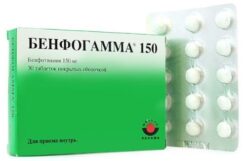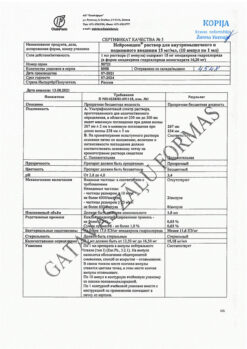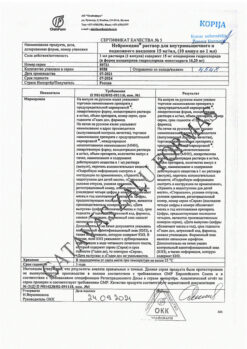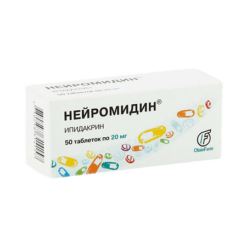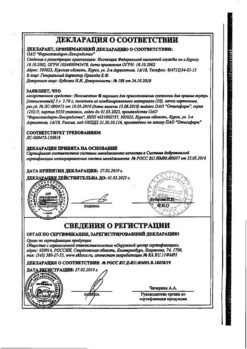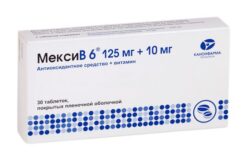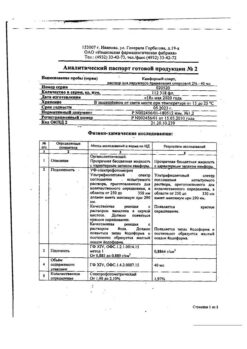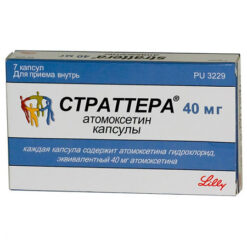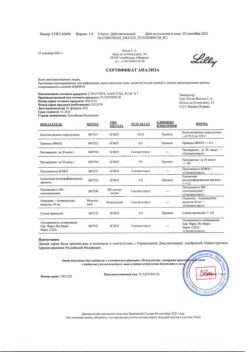No products in the cart.
Eglonil, 50 mg/ml 2 ml 6 pcs
€1.00
Out of stock
(E-mail when Stock is available)
Description
Eglonil is an atypical neuroleptic of the group of substituted benzamides. It has moderate neuroleptic activity in combination with stimulant and thymoanaleptic (antidepressant) effects.
The neuroleptic effect is associated with antidopaminergic action. In the central nervous system sulpiride blocks predominantly dopaminergic receptors of the limbic system, and on the neostriatal system it has little effect, it has an antipsychotic effect. The peripheral action of sulpiride is based on inhibition of presynaptic receptors. An increase in the amount of dopamine in the CNS is associated with an improvement in mood, and a decrease in mood – with the development of symptoms of depression.
The antipsychotic effects of sulpiride are seen in doses greater than 600 mg/day; in doses up to 600 mg/day, stimulant and antidepressant effects predominate.
Eglonil has no significant effect on adrenergic, cholinergic, serotonin, histamine and GABA receptors.
In small doses Eglonil may be used as adjunctive treatment of psychosomatic diseases, in particular it is effective in relieving negative psychic symptoms of gastric and duodenal ulcer. In irritable colon syndrome sulpiride reduces the intensity of abdominal pain and leads to improvement of the clinical condition of the patient.
Low doses of sulpiride (50-300 mg/day) are effective in dizziness, regardless of etiology. Sulpiride stimulates prolactin secretion and has central antiemetic effect (inhibition of the vomiting center) due to blockade of dopamine D2-receptors of vomiting center trigger zone.
Indications
Indications
Active ingredient
Active ingredient
Composition
Composition
1 ampoule (2 ml) contains:
active ingredient:
sulpiride 100 mg;
auxiliary substances:
sulfuric acid,
sodium chloride,
water d/i
How to take, the dosage
How to take, the dosage
Treatment usually begins with intramuscular injections at a dose of 400-800 mg per day and continues for 2 weeks. The goal of therapy is to achieve the lowest effective dose.
Depending on the clinical picture of the disease, intramuscular injections of sulpiride are administered 1-3 times a day, which allows rapid relief or resolution of symptoms. As soon as the patient’s condition allows, it is necessary to proceed to taking the drug orally. The course of treatment is determined by the doctor.
Interaction
Interaction
Weakens the effect of levodopa, increases the severity of BP lowering against the background of hypotensive drugs; incompatible with alcohol and other CNS depressant drugs (mutual enhancement of sedative properties).
Special Instructions
Special Instructions
Malignant neuroleptic syndrome: If hyperthermia of undiagnosed origin develops, Eglonil should be discontinued, as this may be one of the signs of the malignant syndrome described with neuroleptics (pallor, hyperthermia, autonomic dysfunction, impaired consciousness, muscle rigidity).
Signs of autonomic dysfunction, such as increased sweating and abnormal blood pressure, may precede the onset of hyperthermia and therefore represent early warning signs.
While these effects of neuroleptics may be idiosyncratic in origin, it appears that certain risk factors may predispose to them, such as dehydration or organic brain damage.
Longening of the QT interval: Sulpiride prolongs the QT interval in a dose-dependent manner. This effect, which is known to increase the risk of serious ventricular arrhythmias such as torsade de pointes, is more pronounced in the presence of bradycardia, hypokalemia or congenital or acquired prolonged QT interval (combination with a QT interval prolonger drug).
If the clinical situation allows, it is recommended that prior to prescribing Eglonil, you verify that there are no factors that may contribute to this type of arrhythmia:
– bradycardia with beats less than 55 beats/min,
– hypoglycemia or hypoglycemic arrhythmia.
– congenital prolongation of QT interval,
– concomitant treatment with a drug capable of causing significant bradycardia (less than 55 bpm), hypokalemia, intracardiac conduction delay, or QT interval prolongation.
Except in cases of urgent intervention, patients who require treatment with neuroleptics are advised to have an ECG as part of the status evaluation.
Except in exceptional cases, this drug should not be used in patients with Parkinson’s disease.
In patients with impaired renal function, reduced doses should be used and monitoring should be increased; intermittent courses of treatment are recommended in severe renal failure.
Control during treatment with Eglonil should be increased:
– In patients with epilepsy, since the seizure threshold may be lowered;
– When treating elderly patients who exhibit greater sensitivity to postural hypotension, sedation, and extrapyramidal effects.
The consumption of alcohol or the use of medications containing ethyl alcohol during treatment with the drug is strictly prohibited.
During treatment with Eglonil, driving and operating machinery requiring increased attention and drinking alcohol are prohibited.
Contraindications
Contraindications
Side effects
Side effects
Endocrine system disorders: reversible hyperprolactinemia may develop, the most frequent manifestations of which are galactorrhea, amenorrhea, menstrual cycle disorders, less often – gynecomastia, impotence and frigidity. During treatment with sulpiride increased sweating and weight gain may be noted.
Digestive system disorders: increased liver enzyme activity.
CNS side: Sedation, drowsiness, dizziness, tremor, early dyskinesia (spastic torticollis, oculogyric crises, trismus), passing with administration of anticholinergic antiparkinsonian agent, rarely, extrapyramidal syndrome and related disorders (akinesia, sometimes combined with muscle hypertonicity and partially resolved by prescription of anticholinergic antiparkinsonian agents, hyperkinesia-hypertoneus, motor agitation, akathasia). There have been cases of tardive dyskinesia characterized by involuntary rhythmic movements, mainly of the tongue and/or face, during long courses of treatment, which can be observed during courses of treatment with all neuroleptics: the use of antiparkinsonian drugs is ineffective or may cause a worsening of symptoms. If hyperthermia develops, the drug should be discontinued, as increased body temperature may indicate the development of malignant neuroleptic syndrome (MNS).
Cardiovascular system disorders: tachycardia, possible increase or decrease of blood pressure, in rare cases development of orthostatic hypotension, prolongation of QT interval, very rare cases of “torsade depointes” syndrome.
Allergic reactions: skin rash is possible.
Similarities
Similarities
Additional information
| Shelf life | 3 years. |
|---|---|
| Conditions of storage | At a temperature not exceeding 30 °C. |
| Manufacturer | Delpharm Dijon, France |
| Medication form | solution |
| Brand | Delpharm Dijon |
Other forms…
Related products
Buy Eglonil, 50 mg/ml 2 ml 6 pcs with delivery to USA, UK, Europe and over 120 other countries.

